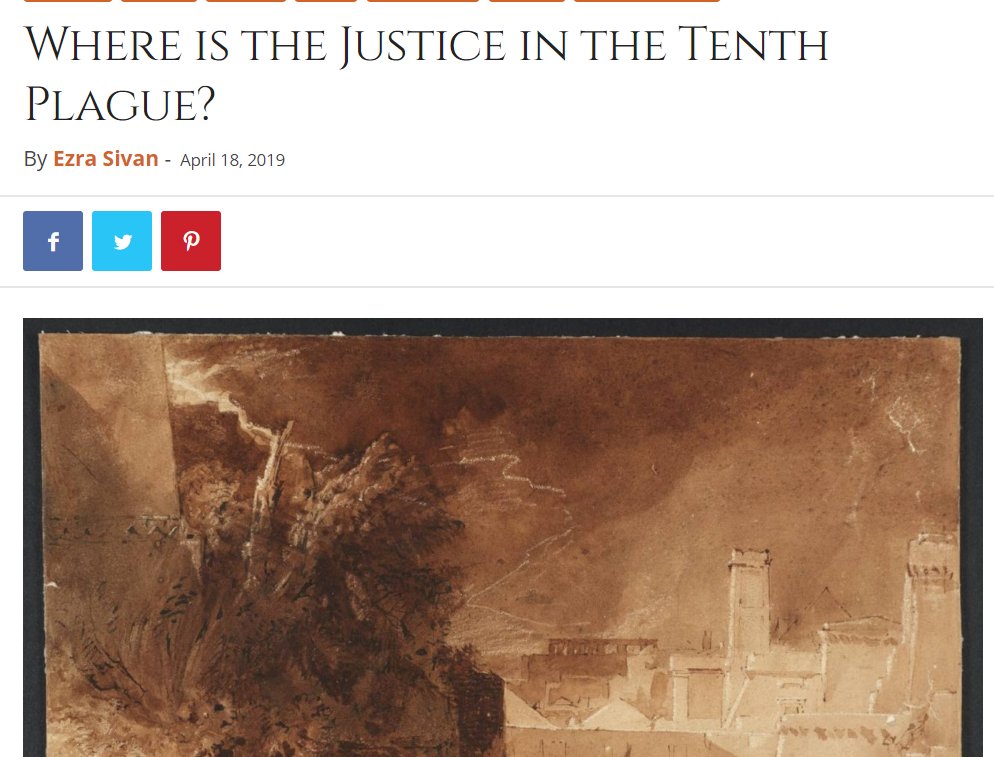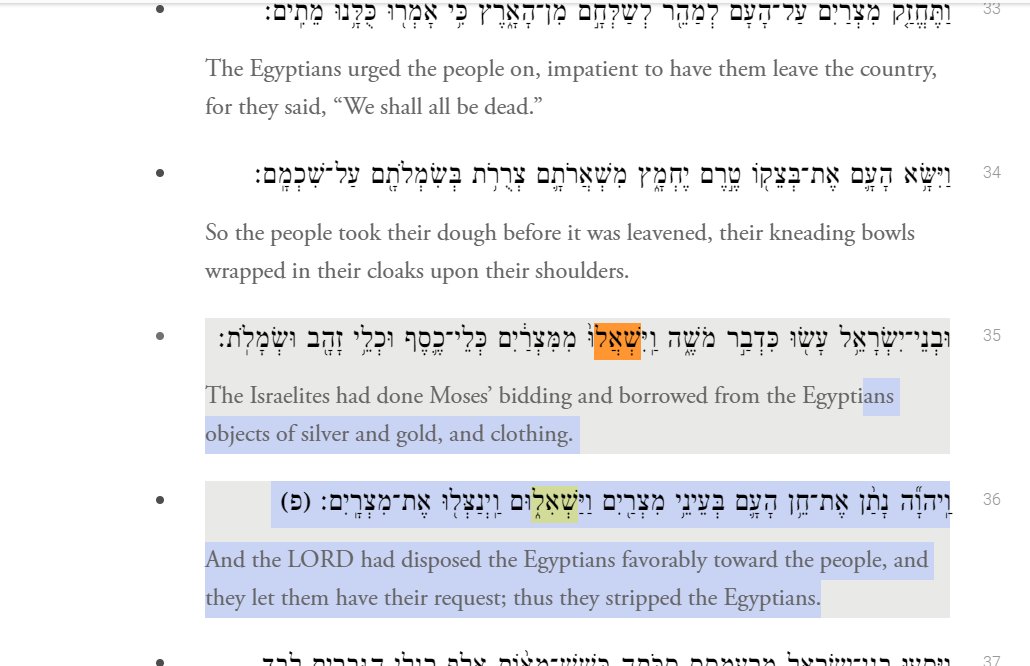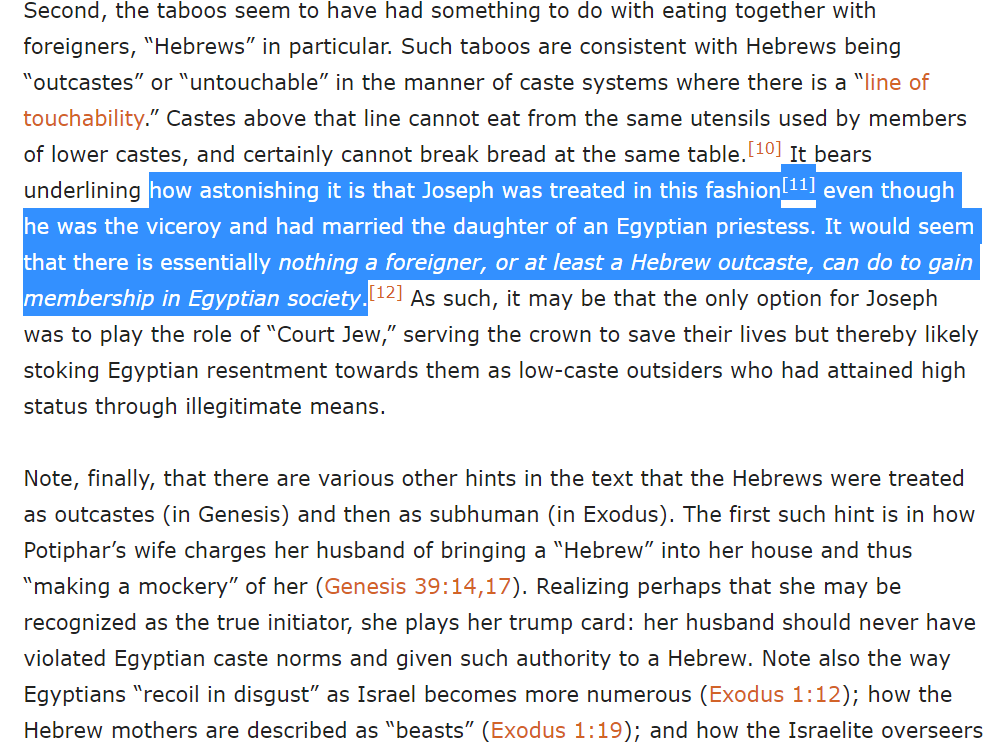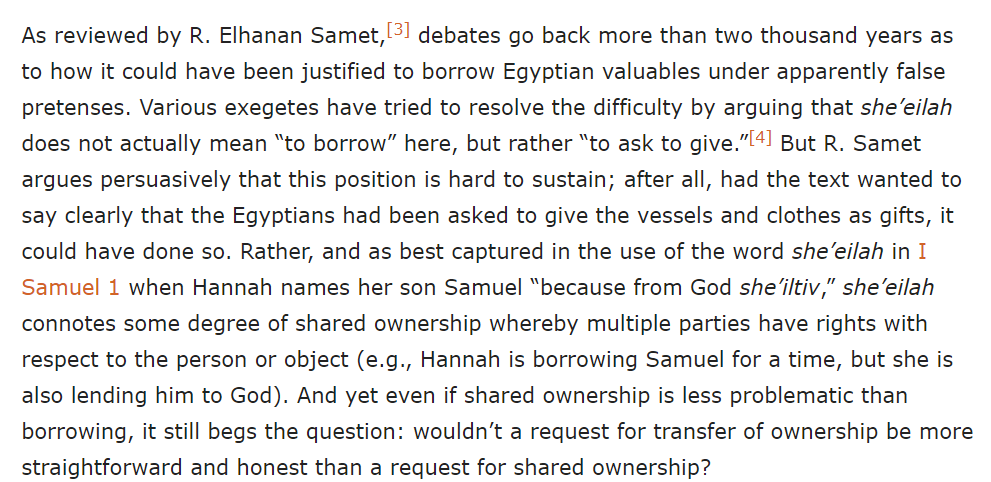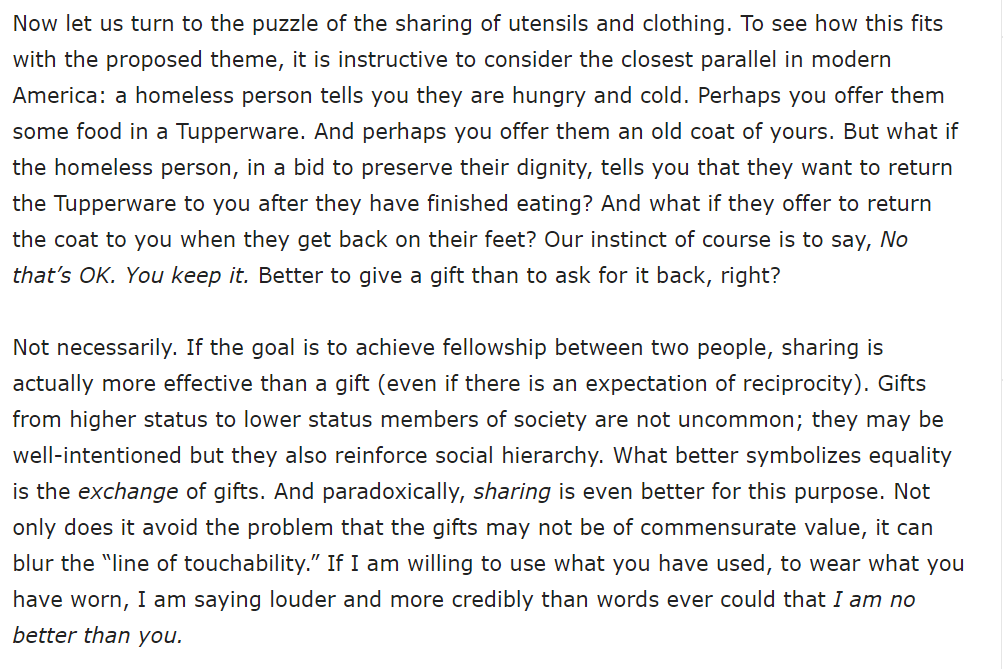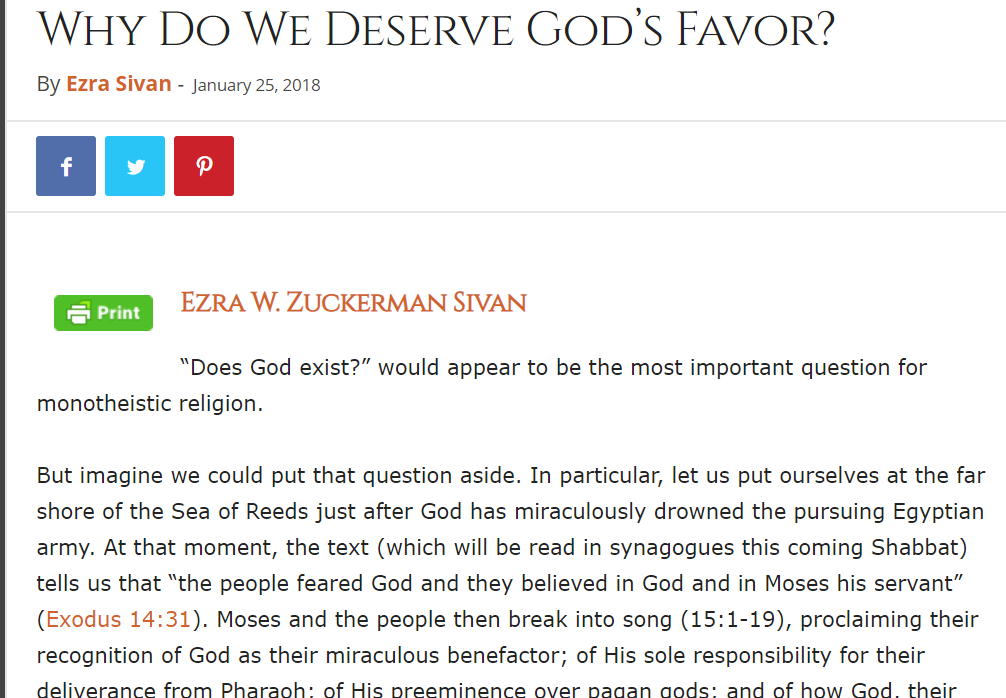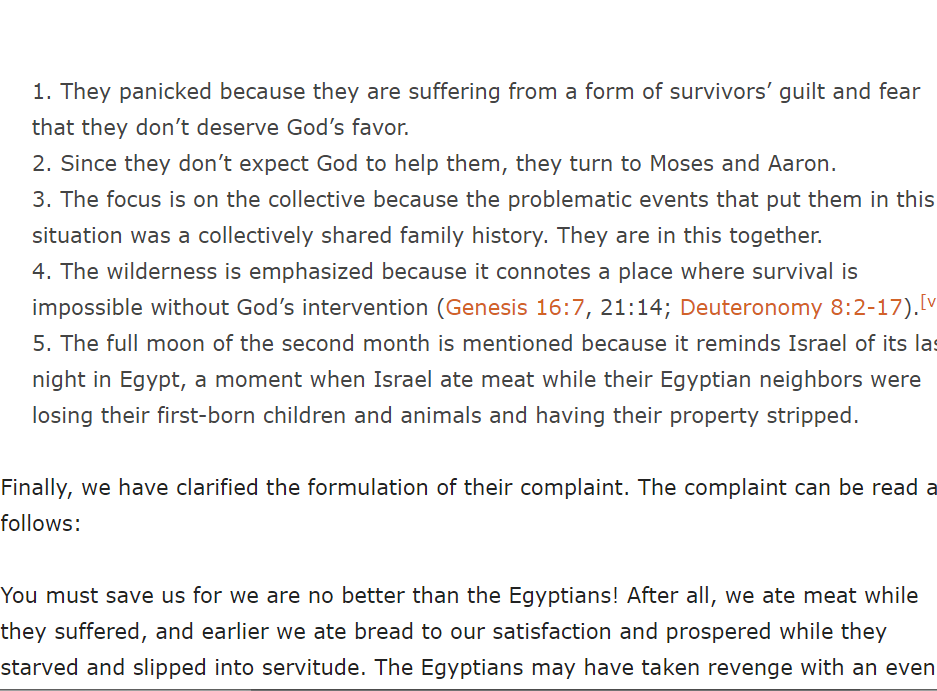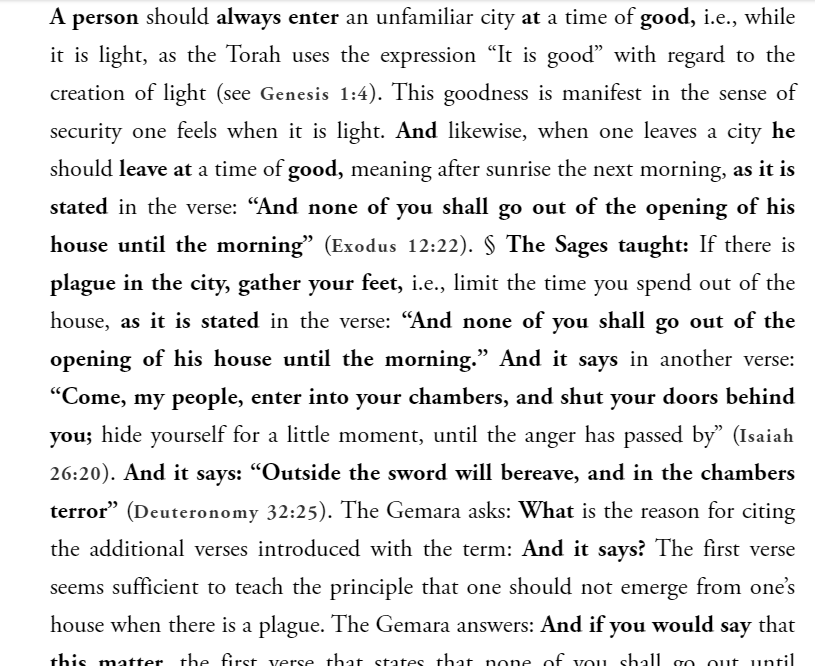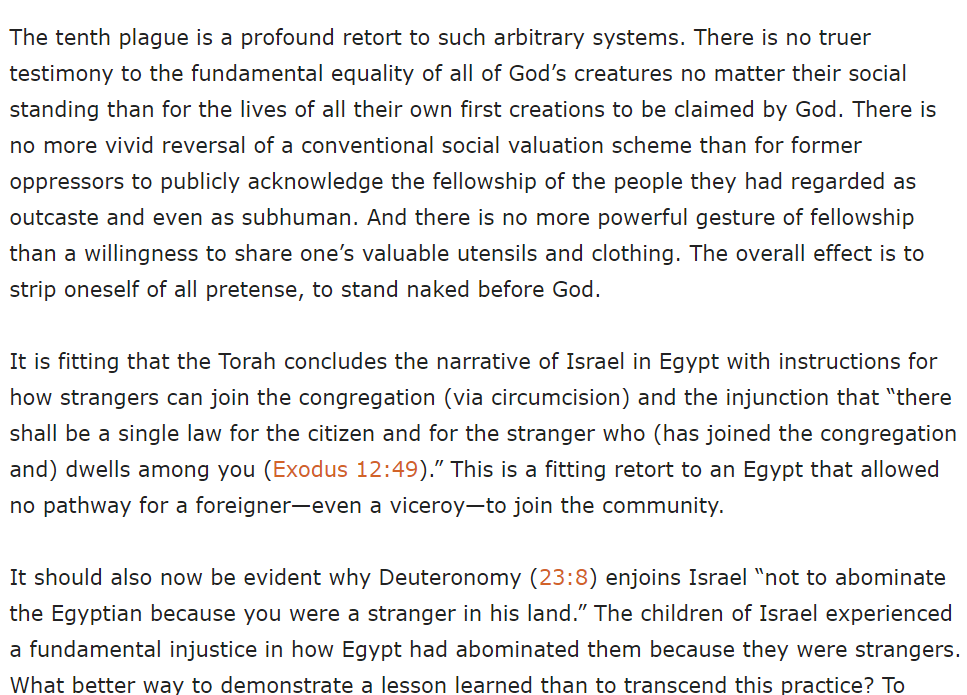The key moment of the night of the Exodus-- commemorated by Jews wed eve-- involved doing *the very opposite* of what we& #39;re all trying to do right now:
Touching a stranger who could contaminate them
& therein a age-old lessons.
A Passover/sociological/biblical THREAD
Touching a stranger who could contaminate them
& therein a age-old lessons.
A Passover/sociological/biblical THREAD
As I discuss in this @The_Lehrhaus essay last year ( https://bit.ly/2V9IE6z ),">https://bit.ly/2V9IE6z&q... it& #39;s hard to answer the Passover Haggadah& #39;s call "to see oneself as if one had left Egypt" without reckoning with the seemingly troubling actions taken by Israel as it was leaving:
to ask the plague-stricken Egyptians ("no house without death") to "share" their valuable clothes & utensils even though Israel planned not to return? To "strip" them of such valuables?
How can such a seemingly unethical act be at the heart of this inspiring story of liberation?
How can such a seemingly unethical act be at the heart of this inspiring story of liberation?
The essay& #39;s key idea:
This sharing* is a powerful symbolic correction of a deep moral problem in (the biblical account of) Egyptian culture: a rigid caste hierarchy with "abomination" of the "stranger" ("Hebrew") as inferior & subhuman.
*See R. Samet on why "share" vs "borrow"
This sharing* is a powerful symbolic correction of a deep moral problem in (the biblical account of) Egyptian culture: a rigid caste hierarchy with "abomination" of the "stranger" ("Hebrew") as inferior & subhuman.
*See R. Samet on why "share" vs "borrow"
Here& #39;s how sharing accomplishes this:
Put differently, if Egyptian society had myths about the inferiority of the Hebrew in Joseph& #39;s time, imagine those myths after centuries of justifying human bondage? (sound familiar?)
Think of the risk that an Egyptian was taking in offering to wear/use what a Hebrew wore/used!
Think of the risk that an Egyptian was taking in offering to wear/use what a Hebrew wore/used!
OK but if willingness to share dismantles the myth of stranger as inferior, what about the seemingly bad-faith
*request* to share?
One idea is that it was indeed problematic, leading to the crisis of "survival guilt" that Israel experienced a month later: https://bit.ly/2UPdh28 ">https://bit.ly/2UPdh28&q...
*request* to share?
One idea is that it was indeed problematic, leading to the crisis of "survival guilt" that Israel experienced a month later: https://bit.ly/2UPdh28 ">https://bit.ly/2UPdh28&q...
But over this past weekend, our pandemic experience made me realize that the *request to share* was also a powerful, symbolic attack on a destructive social myth that keeps people apart: the stranger as contaminator.
This idea should come out in a @The_Lehrhaus essay next week
This idea should come out in a @The_Lehrhaus essay next week
A quick summary for now.
The key is consider the following scene based on a close reading of Exodus 12 ( https://bit.ly/3e5QaHZ )">https://bit.ly/3e5QaHZ&q... & ponder how you would have felt, informed by your pandemic experience:
The key is consider the following scene based on a close reading of Exodus 12 ( https://bit.ly/3e5QaHZ )">https://bit.ly/3e5QaHZ&q... & ponder how you would have felt, informed by your pandemic experience:
There& #39;s a vicious plague afoot in the land
You can hear the wails of the plague-stricken households around you
You& #39;re sheltering in place
You& #39;re doorway is keeping the plague at bay
You can hear the wails of the plague-stricken households around you
You& #39;re sheltering in place
You& #39;re doorway is keeping the plague at bay
Why? Well beyond the reasons this is true for us, here it& #39;s slathered with sacrificial blood. Must have felt like a magical talisman
But so far nothing has happened to you
Your bags are packed as you wait- anxious, terrified- for the planned morning signal to depart
But so far nothing has happened to you
Your bags are packed as you wait- anxious, terrified- for the planned morning signal to depart
But then there& #39;s a terrifyingly loud knock on the door:
The new message from Moses is that you must go
Right now
In the middle of the night
With the screams of suffering & anguish all around
The new message from Moses is that you must go
Right now
In the middle of the night
With the screams of suffering & anguish all around
Think about it:
That doorway has been your protection
You were& #39;t supposed to leave till morning- do you trust these orders to head out into the plague? Does your spouse? Can you agree suddenly, without a fight?
That doorway has been your protection
You were& #39;t supposed to leave till morning- do you trust these orders to head out into the plague? Does your spouse? Can you agree suddenly, without a fight?
& here& #39;s the kicker:
It& #39;s one thing to go out of your house.
Many of us are doing that nowadays.
But the change in plans also includes this:
It& #39;s one thing to go out of your house.
Many of us are doing that nowadays.
But the change in plans also includes this:
You are to go to one of the plague-stricken houses!
You are to interact with someone who has been struck!
You are to touch & wear the clothing they& #39;ve worn
You are to touch & use utensils they& #39;ve used
Who would do THAT?
You are to interact with someone who has been struck!
You are to touch & wear the clothing they& #39;ve worn
You are to touch & use utensils they& #39;ve used
Who would do THAT?
Throughout history, you didn& #39;t need the germ theory of disease to know that this is a very very bad idea-- the Talmud cites this very story to support that!
So who would dare leave the protection of their home?
Who would go into someone else& #39;s & touch their things?
So who would dare leave the protection of their home?
Who would go into someone else& #39;s & touch their things?
It has to be someone who is convinced that this is no ordinary plague-- that it was highly targeted (first-born Egyptian), such that not only am I at risk but also this-- one has to act on this thought:
"I have nothing to fear from the stranger just because he& #39;s not family"
"I have nothing to fear from the stranger just because he& #39;s not family"
The upshot is a moral lesson that& #39;s so relevant today.
Just as the "social distancing" we& #39;re doing today seems like it& #39;s erecting social barriers is actually meant to help one another across them, this climactic moment of the Exodus is a powerfully productive pro-social act.
Just as the "social distancing" we& #39;re doing today seems like it& #39;s erecting social barriers is actually meant to help one another across them, this climactic moment of the Exodus is a powerfully productive pro-social act.
It at once explodes two age-old social myths:
The stranger as inferior
The stranger as contaminator
In fact, we& #39;re all equal -"stripped" naked before God & each other- & we need our families but also to transcend inter-familial boundaries.
Happy Passover חג כשר ושמח
Stay safe
The stranger as inferior
The stranger as contaminator
In fact, we& #39;re all equal -"stripped" naked before God & each other- & we need our families but also to transcend inter-familial boundaries.
Happy Passover חג כשר ושמח
Stay safe

 Read on Twitter
Read on Twitter